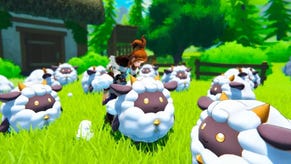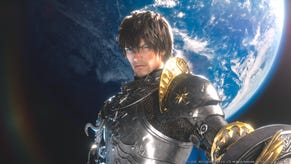Is Palworld actually any good? Of course not
Electabuzzkill.
You might have heard about it. Palworld is utterly gigantic, the first big mega-hit of 2024, and potentially the biggest game we'll get all year, at least in terms of sheer popularity and players. And certainly in terms of the controversy and conversation around it at launch.
If you're yet to hop on board and wondering about what you're missing, you can relax. Palworld is big and controversial; it is also absolute rubbish. It's primitive and derivative, a game that appears at first glance almost to be completely fake - the type of thing quickly mocked up for a three-second appearance on a teen's PC monitor in the background of a mid-budget TV drama. A game to be played one-handed with an N64 controller by Tony Soprano - although honestly I think even he'd deserve better.
It's difficult to know where to begin with games like this - how do you break this down into its constituent problems when they're eclipsed by its very nature as a cynical, precision reverse-engineered machine, designed to bottle your attention and refine it into concentrated cash?
And it is cynical: here's developer Takuro Mizobe talking to Wired Japan in 2022 and responding, with some admirable candour, to a question about Nintendo, the culture there of prioritising creating original, high-quality work, and why he didn't get on with that (as translated by Eurogamer):
"I have a deep-rooted desire for my work to be enjoyed by as many people as possible, and to that end, if there are good ideas in the world, I pick them up, and I don't think I need to be particular about originality. I want to make it less serious, or rather, more easy-going. I think it's good to create something in that way, like jumping on what's trendy (lol)."
Fair enough. My best attempt then, I think, would be to have a go at reverse-engineering the problem with Palworld myself. Much of the grumpiness around Palworld so far - and admittedly, a not-insignificant portion of mine - comes from its success. If all of this feels a bit brutal for a discussion of an indie game that came out of nowhere, it's worth bearing that success in mind. Palworld is wildly popular, not just in terms of sales but actual player satisfaction. Its Steam review numbers - around 57,000 reviews at "Very Positive" - are huge outliers for a game this early in its life. Especially an Early Access one from an independent developer in Japan, with seemingly minimal pre-launch marketing buzz and no major publisher behind it. Cynicism coupled with success is already enough to leave you feeling sour.
But more than that, and more importantly, the feeling of playing Palworld is sour. Start up the game and you're given an option to play solo or on a multiplayer server, a typical character creator, and then you're plonked into place at the bottom of the food chain - and skill tree - in an extraordinarily generic world. Breath of the Wild's watercolour mournfulness was already diluted into blandly vivid green hills in Genshin Impact; here it's watered down once again, filtered through mobile shovelware, to the entirely vapid non-place of the Palapagos Islands.
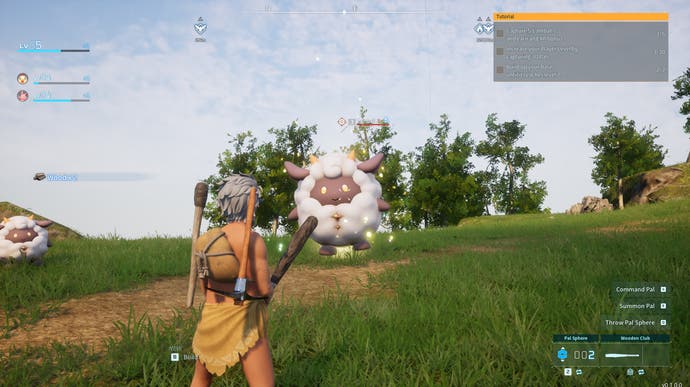
From there, in every direction is something you've seen before, removed and placed here without its context, without much in the way of world-building, thematic sense or general care. Yes, there's the Pokémon element: roaming creatures, with undeniably (and maybe copyright-infringingly) close likenesses to the official ones. You can throw a Pal Sphere at them, which wobbles three times before a successful catch, and you can make them battle - albeit to the death.
But it goes far beyond Pokémon - in fact the Pokémon-with-guns joke, as well as already wearing a little thin, is also a bit of a misnomer. You'll need to pick up twigs and rocks to make a crafting bench, and more to make an axe and a pickaxe, and then go hack and whack your way to more, to make a house for shelter from the cold of night or the violence of other human players. Hello Minecraft, Ark, Rust, Valheim et al. The font and musical jingles of a new location are straight-up Breath of the Wild again, and the fast travel statues strikingly close to those of Genshin Impact. Progress further and you'll be able to put your Pals to use in automated production lines, which might remind you of Factorio or, well, a good chunk of the Steam top-seller charts from any point during the last few years.
Back to the sensation of actually playing it though, and naturally Palworld doesn't feel particularly great. In a literal sense, whacking wobbly trees with axes and a single recurring combo of axe-swing animation and sound does not feel nice. Nor does punching otherwise docile sheep to death with your bare fists, watching your stamina run dry during slow, rudimentary climbing animations over rocks with visible seams, or running out of breath as you lug more stones up a hill. Beyond the rapidly degrading impact of its tonal punchline, there's not much by way of thrills.
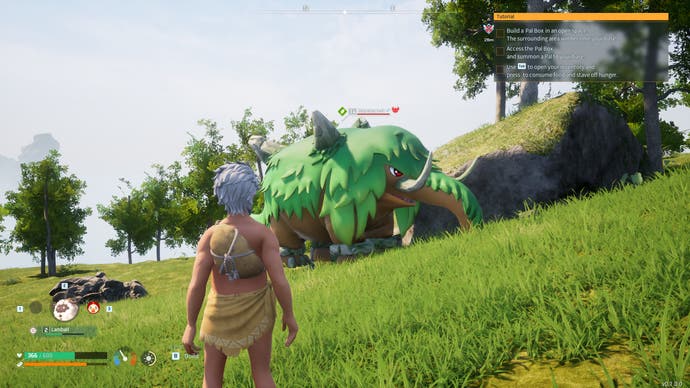
The same goes for that humour, which is less edgy than it's been made out to be and more of the "lol so random" internet humour kind. When Pals break loose of a thrown Sphere, a "cheeky bastard!" tooltip pops up in the corner. When they're killed, they roll off, ragdoll-like. The intention is obvious - it's an attempt to make the implied cruelty of monster-collecting games into something overt, in part for comedy and in part as a kind of clever subversion. The problem is that this take on party-based monster battlers, as well as that joke, is just plain old.
Instead, the thrill in Palworld - and admittedly I'm yet to get too far, or set anything elaborate going - seems to come from the bottomless font of engagement that is false progression. Mash in some not-Pokémon's faces, hit a rock, mine some ore, craft a club, or do just about anything and some XP will pop out. You level up your character, your Pals, your base, improving your stats and progressing through a mostly nonsensical skill tree, and the reason for Palworld's success is pretty clear. Among other things, it's a compulsion loop.
Plenty of games are, of course - just look at the biggest successes of the past decade or so, across any section of the industry you fancy - it's just Palworld doesn't bother to hide it. It's also assembled in an admirably intuitive package. If you've a basic awareness of video game logic from the five biggest games of the past 20 years - Pokémon, Minecraft, Fortnite, anything survival-y and online, or anything itself derived from those - you'll get it.
I'm still trying to reverse-engineer this one, so let's pull back a tiny bit further. The real problem with Palworld is less the derivative approach itself, than it is it's total shamelessness. It might be oddly refreshing to be so open about your cynicism, but it also has an impact on the player. Play Palworld and you won't feel like you're playing something made with thought, or craft, or an earnest team's best intentions. You won't feel admiration or wonder. You won't feel any real sense of achievement. You won't feel like any artist has been involved, or that anything meaningful might come to mind. You will instead feel like you're playing a product designed to be sold, rather than to be played. You will feel like a mark. And you'll be right.
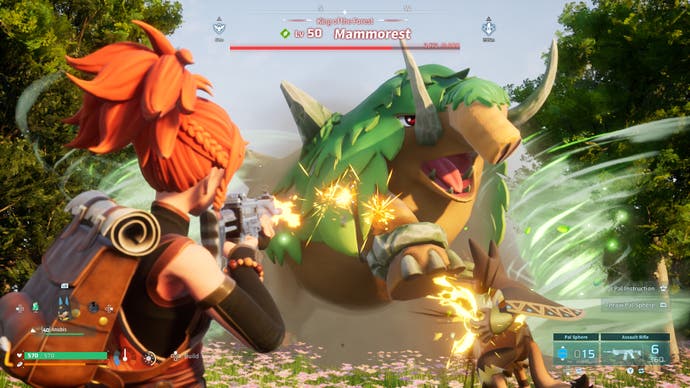

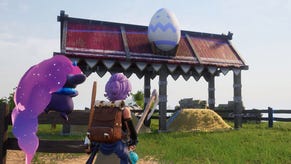
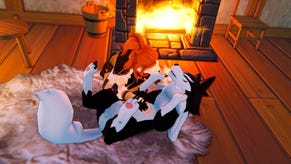

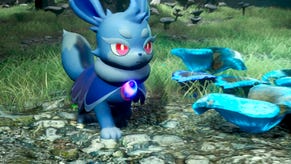

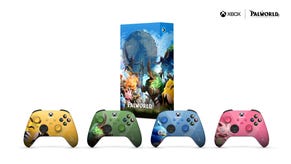
.jpg?width=291&height=164&fit=crop&quality=80&format=jpg&auto=webp)
